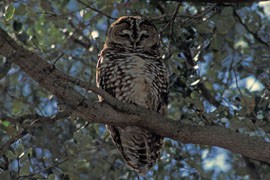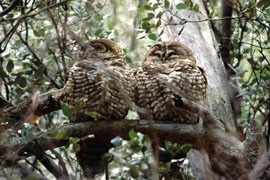Cronkite News has moved to a new home at cronkitenews.azpbs.org. Use this site to search archives from 2011 to May 2015. You can search the new site for current stories.
Officials say spotted owl doesn’t matter one hoot in Tombstone water feud
WASHINGTON – The U.S. Forest Service and the Goldwater Institute have finally agreed on something: The Mexican spotted owl does not matter when it comes to the latest twist in the Tombstone water war.
A reported owl sighting while volunteers were in the Miller Peak Wilderness Area to work on the town’s damaged water lines this weekend raised fears among volunteers that the threatened bird would further delay repairs.
But a Forest Service official said Monday that the owls’ presence will neither slow nor hasten the permitting process required for work to be done on the water line. And a lawyer with the Goldwater Institute, which is helping the town sue the government over the issue, said he expects the nesting birds to be gone long before a court ruling is hatched.
Coronado National Forest Supervisor Jim Upchurch was not able Monday to confirm a CNN report that forest rangers had spotted a nesting pair of owls and an owlet in Miller Canyon near Tombstone on Friday afternoon. But he said he would not be surprised if there had been a sighting.
“The spotted owls have been there a long time,” Upchurch said. “They’ve been known to regularly inhabit that area.”
That area has springs that supply Tombstone’s water, but the springs and pipeline were damaged in flooding that followed last year’s wildfires. Some temporary repairs were done, but city officials say they need to do more, and more substantial, work to stabilize the lines before this year’s monsoon season.
Forest Service officials say they have been working with the city to grant the needed permits, but that Tombstone officials have not provided sufficient detail to let regulators approve the use of heavy equipment on federal lands. Without that detail, officials say, they cannot issue permits under a 1964 law limiting the use of heavy equipment on such lands.
The Forest Service did allow work this past weekend, when up to 100 people showed up with shovels, saws and other hand tools, ready to hike into the Huachuca Mountains to reinforce the shored-up water line. Only 75 members of the so-called Tombstone Shovel Brigade were able to make the steep two-mile hike in the 100-degree temperatures.
While progress was made, there’s still work to be done, said shovel brigade supporter Harv Twite.
“It was worth it to see the people’s faces and to know that Tombstone was supported from across the country,” Twite said. “They’re good people trying to do the right thing by their neighbors and by their community.”
It was while the shovel brigade was working that the reported owl sighting came.
“I was stunned to see that forest rangers had actually seen a spotted owl, but it sure doesn’t help the effort,” Twite said. “Now the ability to fix their water is going to be jeopardized.”
But Nick Dranias, constitutional director for the Goldwater Institute, said the owls won’t change anything in terms of the legal fight over the water issue.
“It’s kind of meaningless because our appeal won’t be decided until spotted owl season is over in October,” Dranias said. “Unless magic things happen, I can’t imagine it taking less than a few months to rule.”
Upchurch said that if the owls are there, it will not affect the way his office handles the town’s request.
“The spotted owl is not the reason why we’re not allowing Tombstone to do anything,” Upchurch said. “The main point is that Tombstone has access to the water they had before the fire.”
Tombstone Public Works Project Manager Kevin Rudd said it would be a little late for the Forest Service to start worrying about the spotted owl, pointing to what he called forest mismanagement that aggravated the effects of last year’s wildfires.
“I’m pretty confident that what the Forest Service did to them (the owls) by mismanaging their habitat was more disruptive than anything we’re doing with this pipeline,” Rudd said.
“I don’t ever want people to think we don’t have an environmental conscience,” he added. “I think what happened in the wildfires last year was a tragedy.”
Twite said the volunteers plan to come back “in full force” for another work weekend sometime in October, when temperatures will be cooler and more conducive to manual labor. He estimated that $5,000 and 500 shovels have been donated to the group so far.








